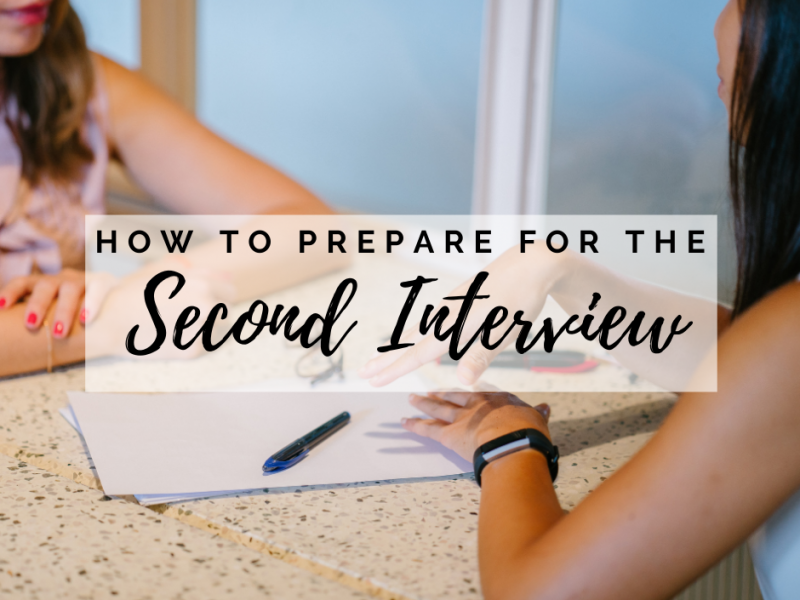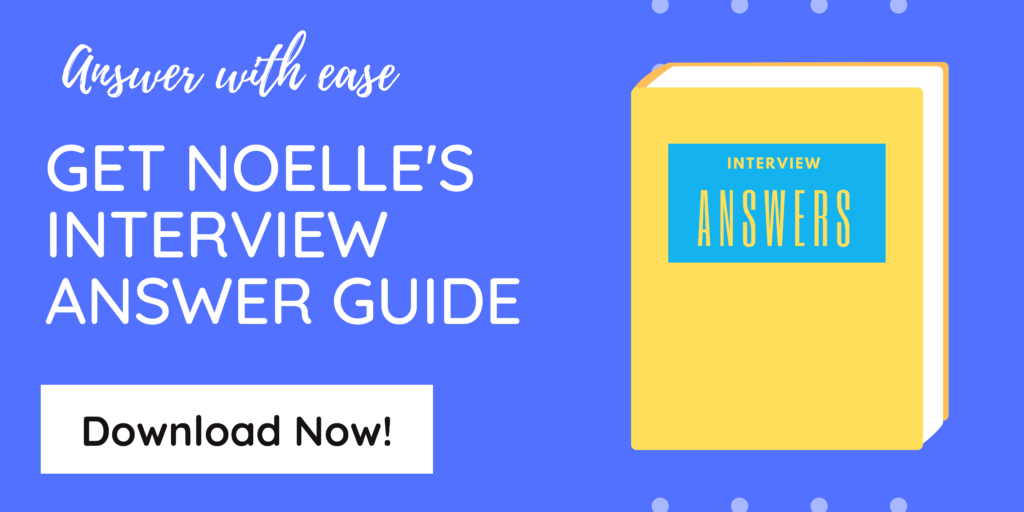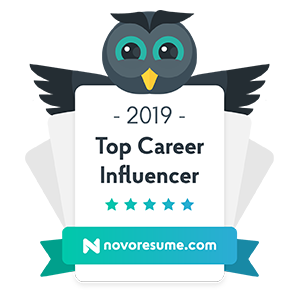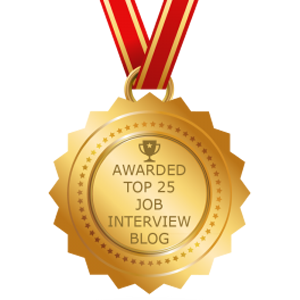Landing a second job interview is a huge accomplishment but it’s not time to celebrate yet. Now is the time to get focused on advancing to offer stage. While job interviews aren’t totally in your control, there are ways to increase your chances of acing the interview. In this post we will share what to expect, tips for how to prep for the second interview, and increase your chances of landing an offer.
What the second interview means for you (hint: it’s really good)
Congrats on nailing the first interview! Well done. With the second interview looming, you know that it’s not over yet. However, take a moment to embrace the reality of the situation. Landing the second interview is a big deal. Advancing to the next round is a strong sign that the key hiring decision makers are invested in you. If they didn’t think you had potential to be the next hire, they would not be spending their precious time getting to know you. So take a deep breath and embrace this truth. You are seen as potential. They like you. They believe in you. So keep believing in this as well. All you have to do now is continue representing their dream candidate (aka YOU).
What the second interview means for the competing candidate pool
Since some candidates were eliminated after the first round of interviews, there is less competition for the job. However, this doesn’t mean you get to slack. This means you’ll have to focus on finding a way to stand out among a smaller pool of qualified candidates. Because of this, the interview process will become more intense. Since standing out amongst the candidate elites is your task, preparation will become even more critical than interview numero uno.
Don’t stop the interview prep
While you are indeed one step closer to landing the job, now is not the time to sit back and relax. You need to be well prepared for what lies ahead. The second interview means it’s go-time. You’ll want to really continue to shine so that the people who are bringing you back, will look like superstars for doing so. They aren’t totally convinced yet so you can’t leave anything to chance. One way to do this is by having done your research. You want to focus on being well-versed on the company and role. You also want to continue with your mental interview preparation. This will be important since it’s about to get more intense.
Download Noelle’s Behavioral Interview Prep Master Q&A Spreadsheet
What to expect and who you will meet in the second round
In terms of what to expect, the second interview usually entails a follow-up conversation with any key stakeholders that you would have likely met in the first interview, such as your future boss. You can also expect to meet future team members or even senior leadership. The hiring manager will be weighing his or her colleagues’ opinions so continue to focus on being your best you and creating positive impressions with everyone you meet. You will be able to do this through your conversation so it’s important to have questions ready for each category of employee you might encounter. To prepare for these conversations, you will want to have made note of everyone with whom you will meet. The recruiter or HR rep would have shared this with you when scheduling the second interview. If HR did not share the names and titles of your interviewers, you should follow up and get this information asap. It will be nearly impossible to prepare well if you don’t know anything about the interviewers.
Deepen existing interviewer relationships from the first interview
Since this will be your second time meeting with some of the interviewers, shift part of your focus to building relationships, especially with repeat interviewers. Be professional but let your “nerves” guard down and try to keep the interview conversational – not awkward or tense. Let your personality shine through so they can start to feel a connection as well as any qualities that would make you a cultural fit.
How to engage the different types of interviewers you will meet
Since you know the titles and names of those with whom you’ll meet, do your homework and get to know how they will fit into your role. Use LinkedIn to study the org chart and piece together your target department. Figure out how you might interface with the various titles and stakeholders on the job. Then take it one step further and try to get inside their heads. What are their business needs? What do they need from you to make their jobs easier and more enjoyable? You will want to speak to this in your conversations or at least get to the bottom of this. The more you can represent your interviewer’s ideal candidate, the greater your chances of advancing to offer stage. The key to engaging with different levels of employee is to understand the role they play, how they would interface with you in your new role and key challenges they will need you to help them overcome. If you are interfacing with a team member, get to the heart of how the two of you would work together and what their ideal team member brings to the table.
Watch Noelle’s Interview Prep Masterclass Now!
Ask great questions
Prepare a handful of smart questions to ask your interviewers. Strong, smart questions have the potential to keep interviewers engaged, intrigued, and wanting more. Poor interview questions have the potential to eliminate you from the process. Do a fair amount of research on the organization and your interviewers in prepping these questions. Focus your questions around getting to know each stakeholder very strategically based on these areas of engagement. For a senior stakeholder, ask questions around his or her vision for you in the role as well as the bigger picture company goals. In all cases, ask your interviewers about their challenges, pain-points, and expectations. If you have picked up on any potential employer red flags along the way, subtly probe around these areas as well.
Keep it conversational
The person who talks the most in a negotiation feels they have done the best leaving the conversation. Therefore you can use question-asking to your advantage. Keep the interviewer talking. Your interviewer will feel positive leaving the conversation – and associate that positive feeling with you. Review the interviewers Linkedin profiles to capture any shared background/alumni organizations or interests. Re-engage the first round interviewers on any topics in which they expressed interest initially. If you sense the interviewer is excited about a certain topic, try and keep the conversation flowing around that topic. Demonstrating interest in something that interests your interviewer will create a shared bond and may even tip the scale in your favor once the interview is over.
“I received my final draft of my resume I submitted it to a company I was keenly interested in working for. I got a callback the next day to come in to their office for a brief meeting and testing. The following week, after reviewing my tests, they called me to schedule an in-depth interview for the following day. I got the job I wanted with the conditions I wanted met! Thank you Soozy and Noelle! It was truly a pleasure working with you and you deserve at least 5 stars!”
– Luey | Resume Makeover & Strategy Session Client
Questions you can expect
Your question-asking will be half of the conversation. However you also need to be prepared for the questions that will come your way. Second interview questions tend to shift in nature, from the initial interview which was likely aimed at screening talent out. Expect to answer questions that reveal more depth around specific responsibilities or challenges. Employers will share a specific, hypothetical situation, relevant to your future responsibilities and ask how you will handle it. For these questions, speak to the skills that the hiring manager is trying to assess based on how you plan to handle the situation. The interviewers may also ask questions around any red flags they picked up in the initial interview. Be prepared to answer anything that you feel they perceived as awkward or concerning from the first interview. If any red flags exist, you can be sure the new interviewers will probe to ensure your story lines up with the first interview.
Be prepared to discuss salary
It’s very possible that questions around salary did not come up in the first interview. This is perfectly normal. It was too early in the game and they hadn’t made a decision about you yet. However, the closer you get to offer stage, the more likely the salary questions will be asked. Be prepared to answer the question, “Tell me about your salary expectations.” If salary questions make you uncomfortable, be extra prepared so you can avoid common salary conversation mistakes. If the salary topic does not come up in the second interview, don’t worry. The employer will raise the topic at some point even if it doesn’t appear until offer stage. It’s not a great practice on the part of the employer to wait so long for the conversation, but it’s one you want them to raise when they are ready.
Don’t forget to be you
The second interview is a huge accomplishment and if you have been diligent about preparation, you should be in good shape. When in doubt, remember: people hire people they like, so be confident, pleasant and personable so you’ll leave everyone wanting more.



 How to Mentally Prepare for an Interview
How to Mentally Prepare for an Interview


